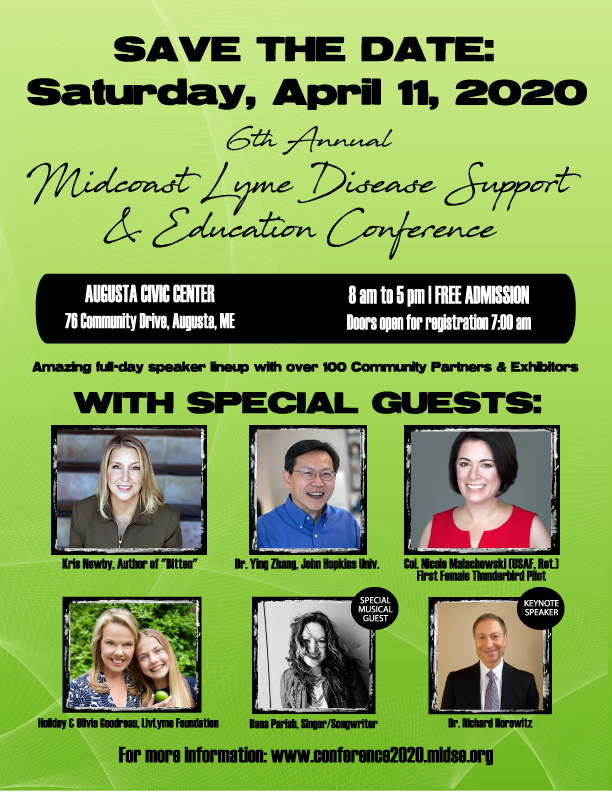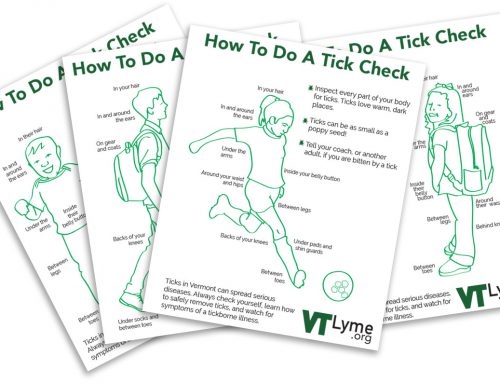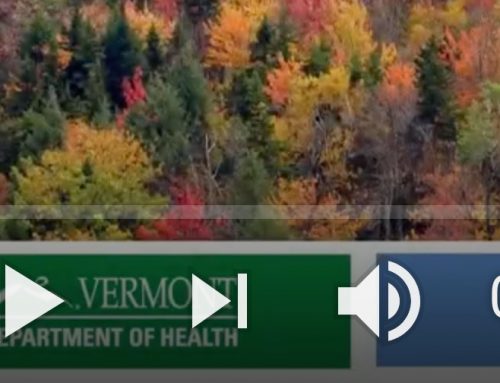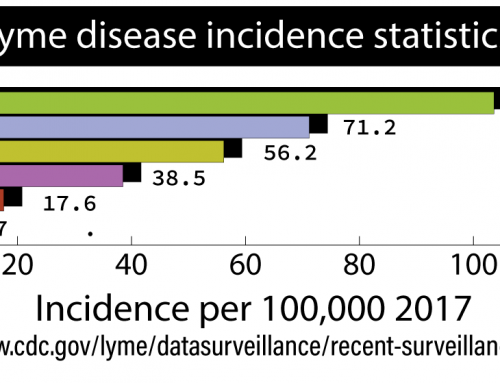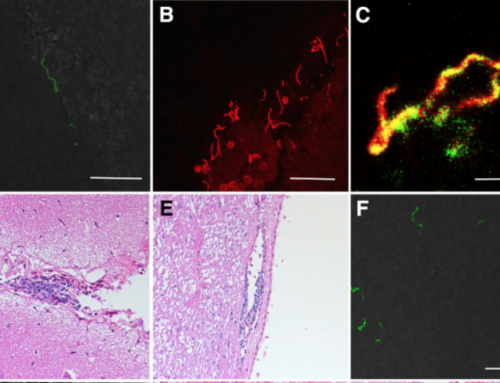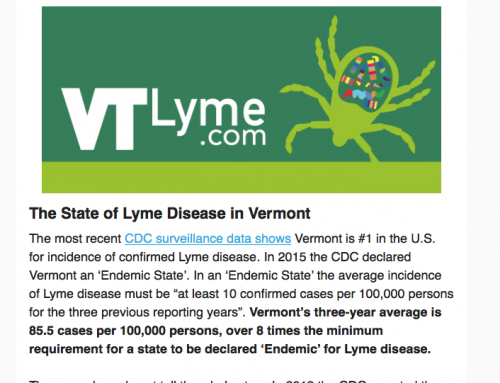Latest News
VTLyme.org Update
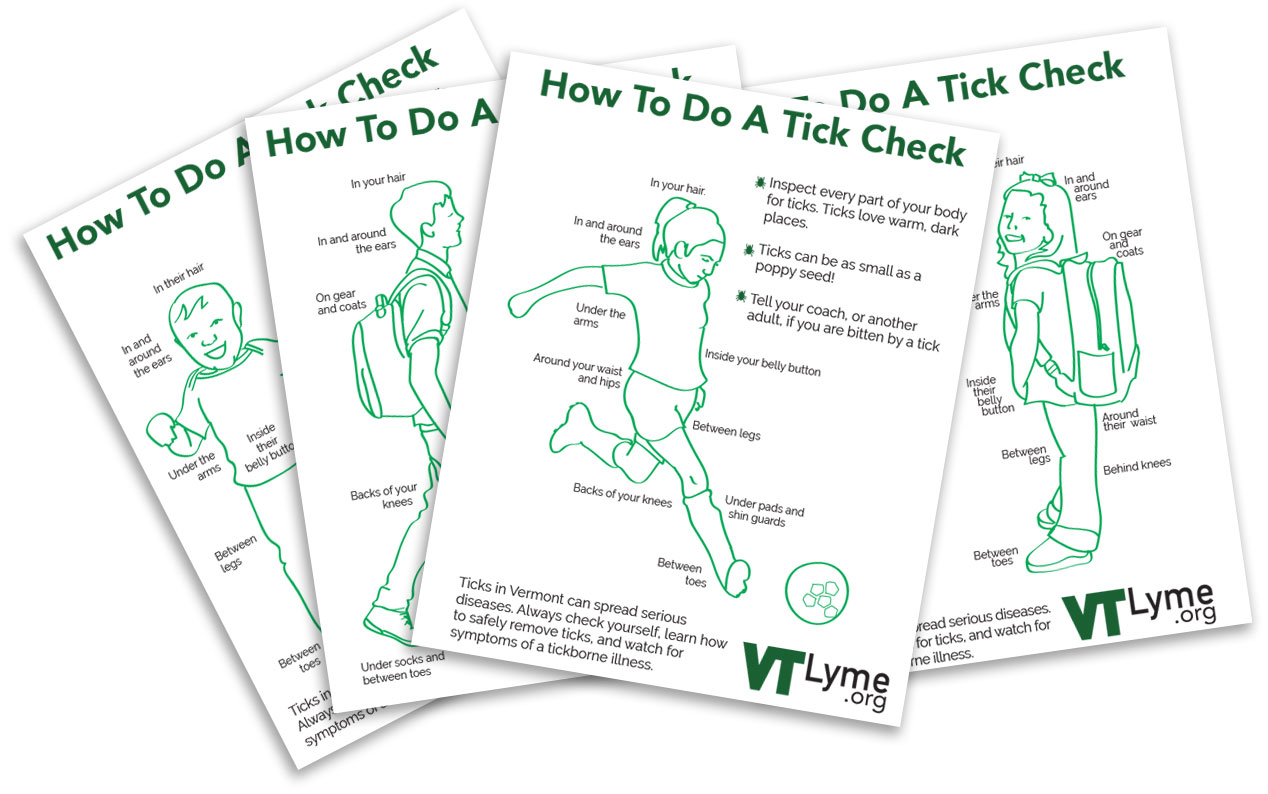 The primary mission of VTLyme.org is to provide Vermonters and their health care providers equitable information about Lyme and tickborne diseases. VTLyme.org recently became a 501c3 non-profit, and was fortunate to receive a grant allowing us to distribute new resources about the prevention and diagnosis of Lyme disease and other tickborne diseases in Vermont.
The primary mission of VTLyme.org is to provide Vermonters and their health care providers equitable information about Lyme and tickborne diseases. VTLyme.org recently became a 501c3 non-profit, and was fortunate to receive a grant allowing us to distribute new resources about the prevention and diagnosis of Lyme disease and other tickborne diseases in Vermont.
Partnering with the Global Lyme Alliance, VTLyme.org will be sending letters to every school in Vermont with information about accessing a free K-12 curriculum and resources designed to help children prevent tick bites and recognize the symptoms of a tickborne disease. VTLyme.org also created posters encouraging children and families to do regular tick checks. These will be distributed at no cost to schools, recreation departments, and early childhood education centers. We also have letters for athletic coaches, daycare providers and afterschool coordinators to help them understand the importance of tick bite prevention, and a field trip notice reminding students and chaperones to check for ticks after being in tick habitat.
We recently reorganized our website to make resources more accessible, and added additional resources for health care providers, and more information about tick bite prevention.
 Our new postcard series for young adults in Vermont helps them understand symptoms of Lyme disease may include mood swings, cognitive changes, anxiety, OCD, or depression.
Our new postcard series for young adults in Vermont helps them understand symptoms of Lyme disease may include mood swings, cognitive changes, anxiety, OCD, or depression.
And stay tuned… we are working on a provider conference next November, and a campaign to put signs about the importance of tick checks at trailheads and local recreation areas in Spring, 2020.
VTLyme.org is a new and growing organization dedicated to addressing the impact of Lyme and tickborne diseases on Vermonters. If you are interested in volunteering with VTLyme.org please contact us!
In Our Community….

Helping to make VTLyme.org’s work possible is the Vermont Pin-Up Girl Calendar. Julie Prior, with humor and resiliency, created this 2020 calendar to support VTLyme.org and fellow Vermonters affected by Lyme and tickborne diseases. Julie partnered with local sponsors and printers to support her project – meaning 100% of each calendar sale will go toward VTLyme.org’s mission of providing Vermonters equitable resources and access to support. Julie was interviewed on WCAX along with VTLyme.org’s vice-president, Pat Bannerman, and for an article in 7 Days. Julie’s work has already had a huge impact, and more calendars are available. Calendars are $10 each, $12 with shipping. To order a calendar email Julie at [email protected] or visit her facebook page.
VTLyme.org in Local Media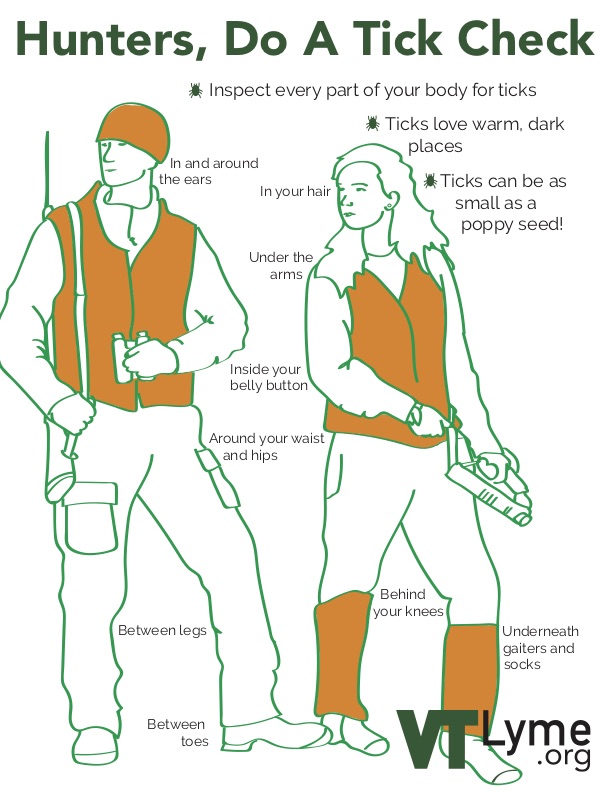
VTLyme.org’s spring article “8 Things You Should Know About Lyme disease in VT” was picked up by several news sources including VT Digger, Bennington Banner, and Manchester Journal.
This article was prompted by a second informal survey of local news stories about tickborne diseases in Vermont. Like the first survey in 2017, this survey showed that contradicting and inaccurate statements about Lyme disease symptoms, diagnosis, and treatment are still frequent in local papers and news items. VTLyme.org published a chart comparing the information about tick attachment time, disease symptoms, and treatment, in these articles.
Another VTLyme.org press release is getting the word out about the spike in tick activity that coincides with hunting season and the heightened risk for Anaplasmosis, as well as Lyme disease, during this season.
Lyme and Mental Health
VTLyme.org has published a new brochure for health care providers titled, Lyme, Tickborne Diseases, & Mental Health – What You Need To Know. This brochure includes information about cognitive and psychiatric symptoms related to Lyme disease and other tickborne illnesses. Disseminated Lyme infections can affect cognitive, emotional, and physiological functioning, and sometimes behavioral or cognitive changes are the only symptoms of a tickborne disease.
Anxiety, depression, OCD, outbursts of rage, mood swings, memory loss, and cognitive difficulties can all be related to Lyme and tickborne diseases.
While a mood or cognitive disorder may be unrelated to an illness, or a reaction to being ill, in some cases infection is actually the biological cause. Because other bacteria, protozoa and viruses are present in Vermont ticks along with Lyme disease, comorbidity may increase the complexity of a tickborne disease.
State of Tickborne Disease in Vermont
Understanding Incidence Rates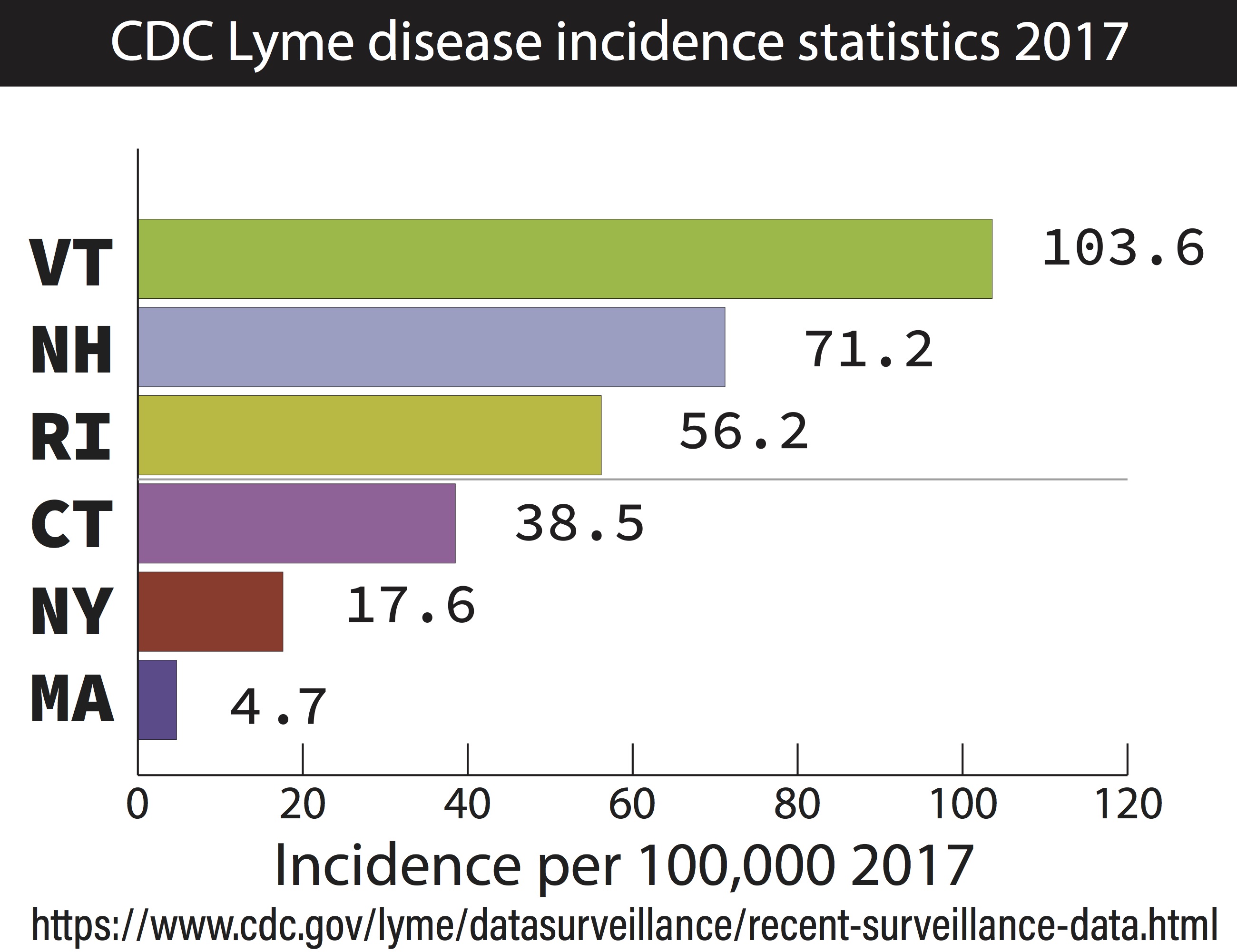
Pennsylvania has the highest number of Lyme disease cases in the US, reporting almost 12,000 residents had confirmed or probable cases in 2017. Vermont’s 1,092 cases seem small in comparison, but the number of individuals who contract Lyme disease is not the most important number. The most important number to know is the incidence rate of Lyme disease.
An incidence rate is the number of people per 100,000 who contract a disease. Pennsylvania’s numbers seem high in comparison to Vermont’s, until you look at the population of each state. Pennsylvania has almost thirteen million residents, whereas Vermont has just over six-hundred thousand.
Pennsylvania’s 2017 incidence rate for Lyme disease was 72.2, while Vermont’s was 103.6.
The CDC defines a ‘high incidence area’ for Lyme disease as one with an incidence rate over 10 per 100,000. Both Pennsylvania and Vermont far exceed that number, and in certain areas of Vermont the incidence rate is even higher. Bennington County’s 2017 incidence rate for Lyme disease was 396.1 per 100,000, and other southern counties in Vermont have incidence rates above 175 per 100,000. Higher incidence rates in the Champlain Valley relate to denser tick populations, though over time tick populations and disease rates have been steadily rising in northern counties.
Why is this important? Vermonters should understand their risk for Lyme and tick borne diseases. Children ages 5-14 are at highest risk for Lyme disease, so knowing how to prevent tick bites and recognize symptoms of a tickborne illness should be priorities for Vermonters, and their health care providers.
Let Fellow Vermonters Know What worked for You!
In 2020 VTLyme.org will begin an online series called “What Worked for Me” where individual Vermonters with Lyme and tickborne diseases share what helped (or didn’t) to address their symptoms and healing process. We would love to hear your story, so please contact us if you would like to share your experience via social media and on our website.
Help Us Inform Vermont Physicians!
In 2020 VTLyme will be publishing a booklet to help guide practitioners in the diagnosis of Lyme and tickborne diseases in Vermont
VTLyme.org has been receiving many anecdotal stories about Vermonters having difficulties accessing treatment for Lyme disease, being misdiagnosed, or experiencing disparities in care. We would like to accurately represent these experiences in a way that can be formally presented to the VDH and other stakeholders. If you, or someone you know, had difficulty being accurately diagnosed for Lyme disease or tickborne disease in the past 12 months in Vermont we would be grateful if you would contact us and we will send you a form by mail or email (your preference) to share your story. We would like to include these as case studies in the book to help Vermont providers better recognize and diagnose Lyme and tickborne diseases.
Editorial: VTLyme.org’s Commitment to Equitable Information about Lyme Disease Diagnosis and Treatment
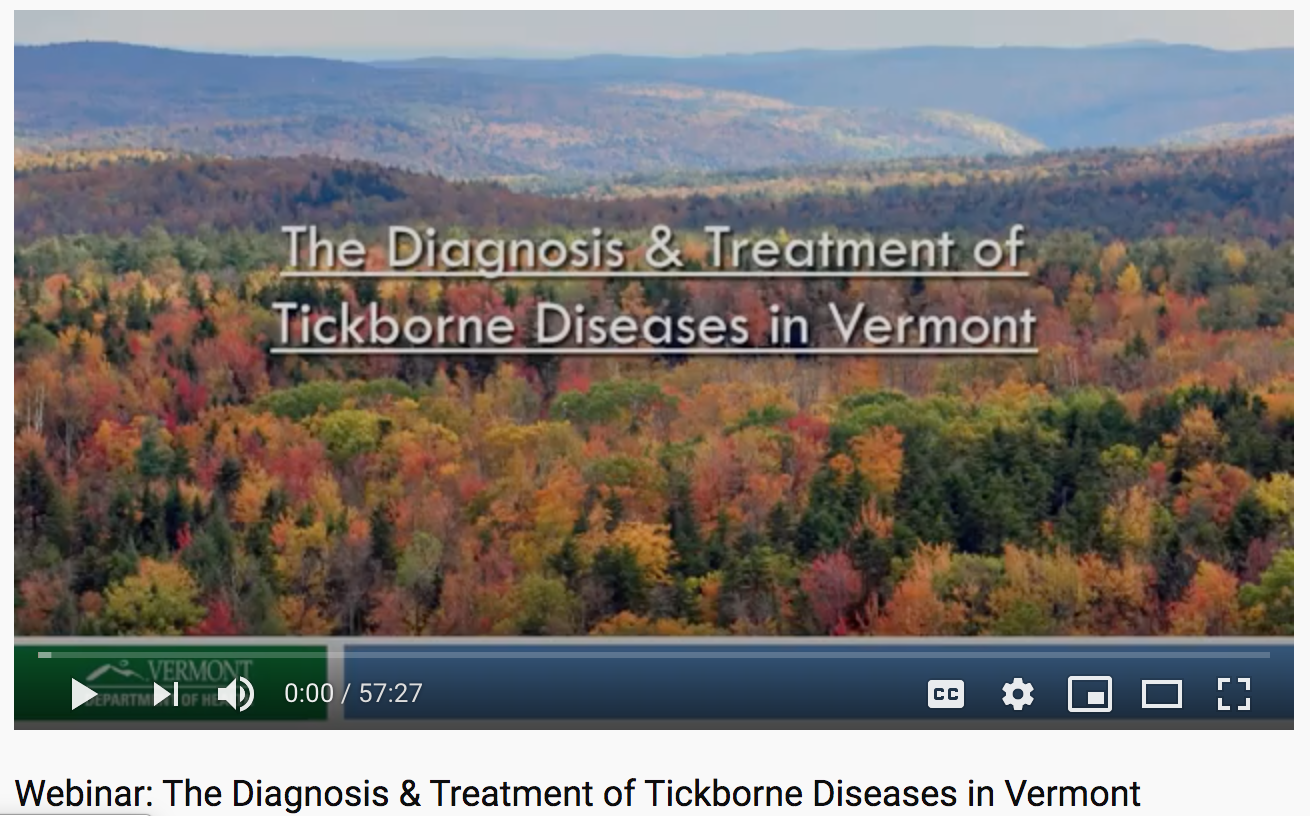 In November, VTLyme.org submitted an evaluation of a Webinar posted by the VDH. This webinar was designed by the VDH to give physicians information about the diagnosis and treatment of Lyme and TBDs in Vermont. While it includes valuable information, it also lacks comprehensive information about diagnosis of disseminated Lyme disease and misrepresents research about Lyme treatment and outcomes. A detailed explanation of our assessment of this webinar is available here.
In November, VTLyme.org submitted an evaluation of a Webinar posted by the VDH. This webinar was designed by the VDH to give physicians information about the diagnosis and treatment of Lyme and TBDs in Vermont. While it includes valuable information, it also lacks comprehensive information about diagnosis of disseminated Lyme disease and misrepresents research about Lyme treatment and outcomes. A detailed explanation of our assessment of this webinar is available here.
Vermonters and their health care providers need comprehensive education about Lyme and tickborne diseases. They should have accurate and up-to-date information about disease presentation using data specific to Vermont. Providers should be trained to understand potential problems with blood tests for Lyme disease, and be able to make a clinical diagnosis in the absence of an EM rash. Additional presentations of disseminated Lyme disease, like those listed on the VDH and CDC websites, should be included in the webinar. Providers should be trained to recognize psychiatric and cognitive manifestations of tickborne diseases, along with behavioral and other unique presentations of pediatric tickborne illness in Vermont’s children.
When we give Vermonters and their health care providers access to thorough and equitable information, we empower them to use their training, expertise, and experience to make informed and individualized health care decisions that benefit Vermonters affected by tickborne diseases, their families, their employers, and their communities.
A Letter From the Founder of VTLyme.org
When I began this project of informing Vermonters about Lyme and tickborne diseases in 2015, the task was daunting, but I was dogged in my belief that other Vermont families should not have to experience what we did. Misdiagnosis, delayed diagnosis, the frustration of trying to navigate medical and education systems, desperation to do anything we could to help our son become well, and the unfortunate isolation that was a result of the financial, social, and emotional impact of a chronic illness.
Fast forward to 2019 and VTLyme.org has become a 501c3 non-profit organization, the only one in Vermont focused on Lyme and tickborne diseases. This did not happen because of me. It happened because a group of dedicated Vermonters formed a board and brought to it their unique talents, and an astounding level of personal commitment. VTLyme.org’s president, Kristin Kassis, has connected with partners and resources that will help us make important information accessible throughout Vermont. Pat Bannerman, our vice-president, is fiercely committed to educating others about disease prevention, especially in Vermont’s schools. Jim Miller is generous with his skills and expertise as VTLyme.org’s treasurer, and Sallie Mack is a passionate advocate for the wellbeing of Vermonters affected by tickborne illnesses. This tremendous group of people has made VTLyme.org’s upcoming plans for 2020 possible, along with the support of individual Vermonters, including those who are contributing to our GoFundMe campaign.
If there is one thing I have learned from this experience it is the vast potential of a group of people coming together and sharing a common goal. The resources now available on VTLyme.org would not exist without this collective effort, and are beyond anything I could have accomplished alone. Truthfully, our family’s experience of Lyme disease left me feeling depressed and isolated for years, but the support of Vermonters like Julie Prior has been a wake up call. I now understand I am part of a dedicated community of Vermonters determined to make important and necessary change in how our state addresses the impact of Lyme and tickborne diseases.
My sincere hope is that VTLyme.org someday becomes obsolete, but until prevention awareness and advancement in treatment make complex tickborne disease a rare event in Vermont we are grateful for those who support our efforts to provide Vermonters equitable information and access to resources. As we continue this work we welcome your input and suggestions, and are grateful to know we have the support of our community! As VTLyme.org works to expand its efforts and impact throughout the state of Vermont we are happy to connect with like minded volunteers who share our mission. If you would like to help VTLyme.org educate Vermonters affected by Lyme and tickborne diseases please contact us.
With respect and appreciation,
Rebecca Zelis
Donate to VTLyme.org
VTLyme.org has launched a GoFundMe goal of 1,000 individual $10 donations to raise seed money and to show that we have community support as we apply for additional grants. If you have already donated, thank you! VTLyme.org is now a 501c3 organization, so donations are tax deductible. Donations can also be mailed directly to our treasurer. More information about donating to VTLyme.org is available on our website.
Save the Date(s)!
Midcoast Lyme Disease Support and Education (MLDSE) will be hosting a patient conference on Saturday, April 11, 2020.
Burlington Area Lyme and TBD Support Group Dates
January 12, March 8, May 17, July 12, Sept 13, November 8
Time: 1pm-3pm Location: PT 360, 426 Industrial Avenue, Williston VT.
The Lymelight foundation offers grants for young people up to age 25 to help them access treatment. Next deadline is December 13th!

